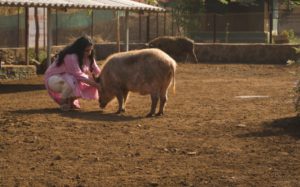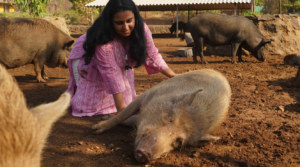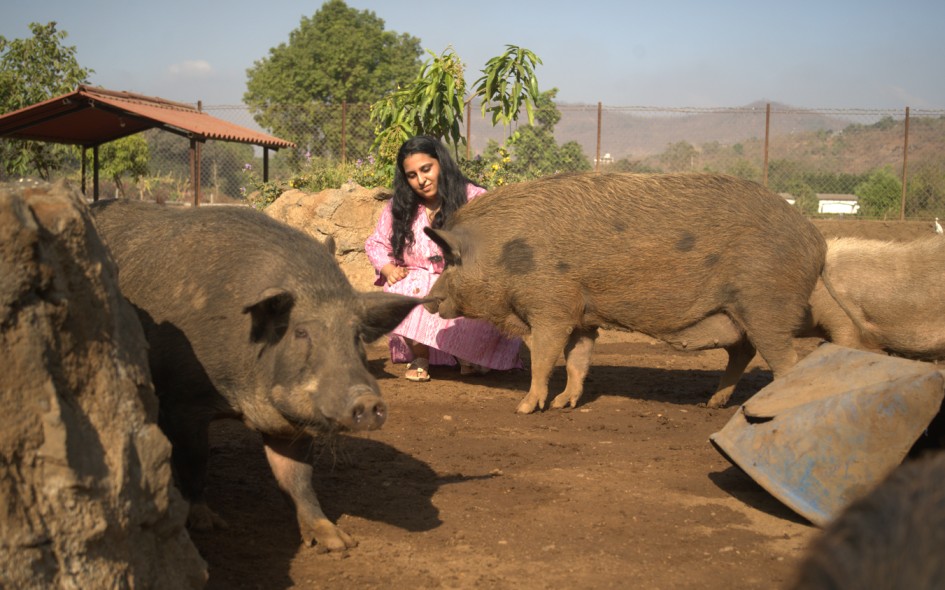GIVE.DO is in conversation with Sunayana Sibal who heads Project Varaha at People For Animals – Uttarakhand and we are discussing the abuse of pigs in factory farms across India and the organization’s response in the form of the rescue and rehabilitation of pigs in captivity.
In this conversation, we learn about our perceptions of this intelligent mammal, their suffering in factory farms, laws against the torture of pigs and how People For Animals – Uttarakhand’s campaign is working to end the inhumane abuse of animals in captivity and bring these animals to a safe shelter with nutritious food, medical attention and the care and affection they deserve.
Here are 5 questions with Sunayana Sibal:
1) Pigs suffer from a bad reputation and are wrongly associated with uncleanness, messiness and other negative qualities. But this is incorrect isn’t it?
Absolutely, pigs are extremely misunderstood animals. They have remarkable abilities and more importantly complex needs. There are so many misconceptions about pigs, the most common being that they are dirty and enjoy unhygienic environments. This could not be more incorrect – research shows that pigs are very discerning and prefer cleanliness in their environments! In fact piglets barely a few days old differentiate between areas where they eat, excrete and sleep.
While we have been led to believe that pigs are not intelligent, and lack the ability to engage in problem solving, researchers at Purdue University found that these animals can actually engage in complex problem solving, navigating video games using joysticks! In fact, pigs are at the very least, as intelligent as dogs, and in many cases outperform them on most problem solving and strategizing tasks.
Another common misconception is that pigs are aggressive animals. In reality, these mammals are social beings – mother pigs sing to their piglets while nursing, and adults build community nests and live in groups called Sounders!
2) Are there provisions in the Prevention of Cruelty to Animals Act, 1960 to prevent the abuse of pigs in factory farms?
The Prevention of Cruelty to Animals Act, 1960 is a Criminal Act which provides for the protection of all animals, including pigs against unnecessary pain and suffering. Pigs in factory farms suffer callous handling, overcrowding and confinement in small spaces, and are often seen suffering grave injuries. They are maimed and mutilated – their teeth are yanked out using rusted pliers and tails docked using excruciatingly painful means. All of this causes unnecessary pain and suffering to the animal and is a form of cruelty. Such acts that cause cruelty to pigs are punishable offenses as per the provisions of the Prevention of Cruelty to Animals Act, 1960. However, there is little to no reporting of the cruelty pigs suffer in factory farms. In fact, this is a hidden industry, and alongside the existence of these farms, the suffering of millions of pigs in these farms has been ignored and neglected.

3) What has been the impact of People For Animals Uttarakhand’s solution to this problem?
People for Animals Uttarakhand has begun making strides in the direction of improving the lives of the pigs reared for pork at factory farms in India. We have begun working with a number of stakeholders on advancing the living conditions and husbandry practices at pig farms – improving the housing conditions and ensuring pigs have access to basic needs, such as clean and hygienic feed and water. We have also initiated interventions focused on protecting pigs from maiming and mutilation. While carrying out our work, we have also been cognizant of the public health, food safety and environmental implications of pig farms running in violation of existing laws.
4) How did your journey begin – to rescue pigs in captivity and bring them to safety?
When we embarked on our mission, it was clear that no organization was addressing the comprehensive welfare of all pigs across India. Despite some localized efforts, the vast majority of pigs continued to endure suffering unnoticed. We identified this critical gap and committed to pioneering systemic improvements to transform their lives, a task that had not been undertaken with such thoroughness before. Furthermore there was little to no information on the conditions of the animals in this sector.
Pigs are intelligent, friendly and compassionate beings that deserve care and protection. As experts in animal welfare, we believed it was imperative that someone raised their voice for the welfare of these animals so that the 9.06 million pigs in India do not suffer in silence.

Although People for Animals, Uttarakhand focuses more on encouraging compliance with minimum standards under law and does not directly rescue pigs, our partner organization – Kalote Animal Trust works to rescue and rehabilitate pigs in need. They have provided a lifelong home to about 21 pigs rescued from situations of grave abuse and cruelty. Most were on the verge of slaughter when rescued and now live happy, fulfilled lives at KAT. Sameer Vohra and his team at KAT have successfully created a space where the pigs are provided excellent enrichment, nutrition, medical care and opportunities to express their natural behaviors. Our team at People For Animals – Uttarakhand is launching a Coalition for Pig Welfare – bringing together rescue and advocacy organizations, veterinarians that care for pigs and individuals interested in virtual adoptions for pigs.
5) Is there a book or documentary that you would recommend people should read or watch to learn more about this issue?
A documentary I would recommend that people watch to learn more about the issue is “Lucent”, which was first broadcast in 2014. Directed by Chris Delforce, it provides a glaring picture of the way the piggery industry in Australia operates. The footage used includes that from 50 pig factory farms across Australia, and uncovers hidden truths. This documentary delves into significant welfare issues and poses an important question: “Do we know where our food comes from?” It prompted me to ponder the true cost of pork. Is it merely the price per kilogram of meat we see in the markets, or is there a deeper, unaccounted-for cost in terms of animal suffering?
–
We encourage you to watch this campaign video appeal to get a glimpse of the suffering that these animals endure on factory farms and join Sunayana’s mission to save them from cruelty:
With your support, Sunayana Sibal and her team at People For Animals – Uttarakhand can save more pigs from the suffering they endure in factory farms across India and give them a safe and loving environment to live in. To join their mission:
Support Sunayana Sibal's mission
–
Give’s mission is to “make giving bigger and better.” Give is the most trusted donation platform in India for fundraisers and crowdfunding campaigns. Through our technology solutions, we enable individuals and organisations to fundraise and donate to a cause, charity or NGO with trust and convenience. Give’s community of 2.7M+ individual donors and 300+ organisations supports 3,000+ verified nonprofits with 80G deduction and serves 15M+ people across India. Find a fundraiser today!

Shirley has been in the development sector for over 10 years and is passionate about making a change in the world around her, including adopting dogs and writing to make a difference.
Discover more from
Subscribe to get the latest posts sent to your email.

